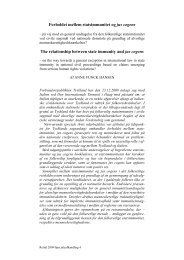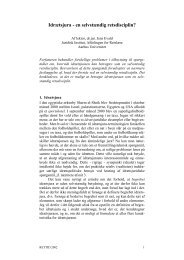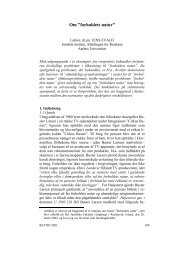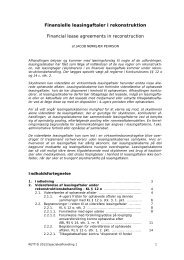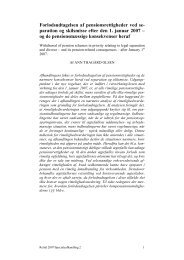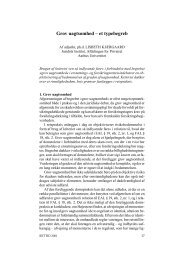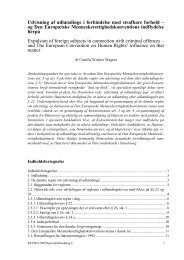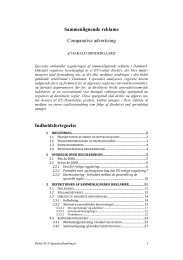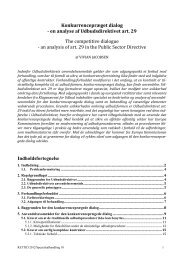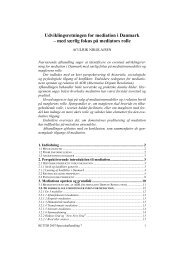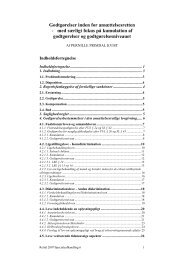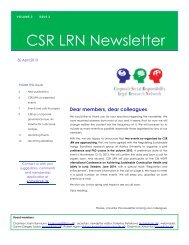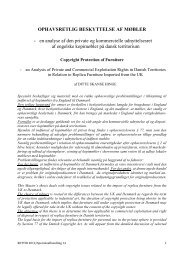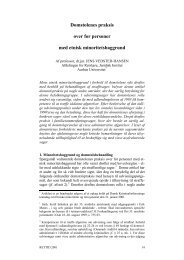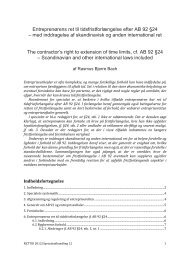Product liability under the CISG and Concurring tort law claims ...
Product liability under the CISG and Concurring tort law claims ...
Product liability under the CISG and Concurring tort law claims ...
Create successful ePaper yourself
Turn your PDF publications into a flip-book with our unique Google optimized e-Paper software.
have effect on domestic <strong>tort</strong> <strong>law</strong>, especially when such a solution is not mentioned in ei<strong>the</strong>r <strong>the</strong> Convention<br />
or <strong>the</strong> legislative history.<br />
The fact that <strong>the</strong> drafters of <strong>the</strong> Convention rejected a proposal to limit recourse to concurring domestic<br />
rules, regarding actions concerning non-conforming goods, 67 could be viewed as an indication of <strong>the</strong> intention<br />
to generally allow concurring <strong>claims</strong>. 68 To consider <strong>the</strong> justification of such a position it is necessary to<br />
go fur<strong>the</strong>r back in <strong>the</strong> legislative history of <strong>the</strong> Convention.<br />
The Convention is rooted in two earlier Conventions, one dealing with formation of contracts (ULF) <strong>and</strong> <strong>the</strong><br />
o<strong>the</strong>r dealing with <strong>the</strong> obligations of <strong>the</strong> parties (ULIS). Art 34 ULIS preempted <strong>the</strong> use of all o<strong>the</strong>r remedies<br />
based on lack of conformity of <strong>the</strong> goods in an attempt to protect <strong>the</strong> uniformity of <strong>the</strong> rules. 69 Consequently,<br />
ULIS took a deliberate st<strong>and</strong> on <strong>the</strong> issue of concurring <strong>claims</strong>.<br />
Such a provision does deliberately not exist in <strong>the</strong> <strong>CISG</strong>. This does not reflect a support for concurring<br />
<strong>claims</strong> in general but only that <strong>the</strong> formulation of art 34 ULIS had <strong>the</strong> unfortunate result of preempting too<br />
much of domestic <strong>law</strong>, since it also meant excluding remedies, which <strong>the</strong> parties had agreed to in <strong>the</strong> contract.<br />
70<br />
Fur<strong>the</strong>rmore, <strong>the</strong> Vienna drafters had <strong>the</strong> hope that a provision preempting concurring <strong>claims</strong> would not be<br />
necessary. This was especially due to <strong>the</strong> fact that art 7 of <strong>the</strong> Convention comm<strong>and</strong>s <strong>the</strong> attention to <strong>the</strong><br />
international character of <strong>the</strong> Convention <strong>and</strong> <strong>the</strong> need to promote uniformity. 71 Since allowing concurring<br />
<strong>claims</strong> poses a direct threat to uniformity, <strong>the</strong> drafters were optimistic that a provision preempting <strong>the</strong> use<br />
of such was unnecessary.<br />
Based on this it is difficult to conclude that since an article preempting recourse to domestic <strong>law</strong> regarding<br />
actions concerning non-conforming goods does not exist, <strong>the</strong> drafters supported concurring <strong>claims</strong> in general.<br />
On <strong>the</strong> o<strong>the</strong>r h<strong>and</strong> <strong>the</strong>re is no clear indication in <strong>the</strong> legislative history of an intention to preempt recourse<br />
to domestic <strong>tort</strong> <strong>law</strong>s on product <strong>liability</strong>.<br />
The only definite thing which can be concluded from <strong>the</strong> legislative history is that <strong>the</strong> Convention does not<br />
apply to <strong>the</strong> <strong>liability</strong> of <strong>the</strong> seller for death or personal injury to <strong>the</strong> buyer caused by <strong>the</strong> goods.<br />
Whe<strong>the</strong>r damage to property is governed exclusively by <strong>the</strong> <strong>CISG</strong> or whe<strong>the</strong>r concurring <strong>claims</strong> based on<br />
domestic <strong>tort</strong> <strong>law</strong> are permitted was not clarified by <strong>the</strong> delegates at <strong>the</strong> Vienna conferences.<br />
Thus it is necessary to examine o<strong>the</strong>r sources to determine <strong>the</strong> appropriate solution to <strong>the</strong> puzzle of concurring<br />
<strong>claims</strong>.<br />
4.3. Doctrine<br />
There are three main positions which have been advocated in doctrine regarding concurring <strong>claims</strong> based<br />
on domestic <strong>tort</strong> <strong>law</strong>.<br />
According to <strong>the</strong> first position, <strong>the</strong> Convention exclusively governs cases of property damage <strong>and</strong> <strong>the</strong> admissibility<br />
of domestic product <strong>liability</strong> <strong>claims</strong> is thus denied. 72 The second position states that domestic<br />
remedies are generally available <strong>and</strong> leaves it up to domestic <strong>law</strong> to determine whe<strong>the</strong>r <strong>and</strong> to what extend<br />
a buyer can claim damages based on <strong>tort</strong> <strong>law</strong>. 73 The last position distinguishes between cases in which<br />
<strong>the</strong> property damage is <strong>the</strong> typical result of <strong>the</strong> breach of contract from cases in which <strong>the</strong> property dam-<br />
67 (A/CN.9/WG.2/WP.16) para 62.<br />
68 Lookofsky: page 26 § 2.6 n. 106.<br />
69 (A/CN.9/62) para 57.<br />
70 (A/CN.9/WG.2/WP.16) para 63.<br />
71 (A/CN.9/WG.2/WP.16) para 64.<br />
72 Honnold, Fourth edition, page 95-102 para 73 <strong>and</strong> Ramberg & Herre page 107-108 para 2.5.3.<br />
73 Magnus page 144-146 pap 9-16, Lookofsky, In dubio, page 287 <strong>and</strong> Ferrari page 73-75 section VI.<br />
RETTID 2012/Specialeafh<strong>and</strong>ling 26 20



